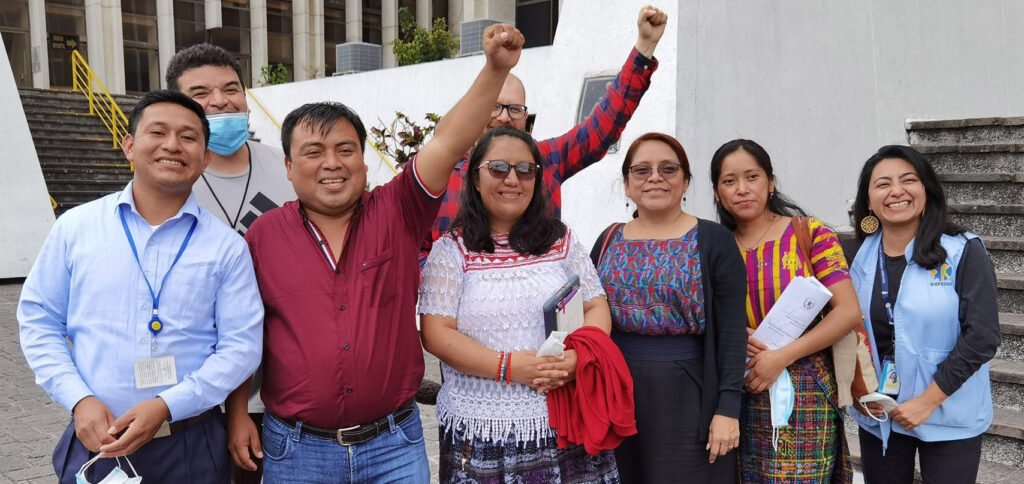Bufete para Pueblos Indígenas

Recuperating Indigenous Land to Stop Environmental Harm in Guatemala
The Milestone
After nine years of litigation and community struggle led by our partner Bufete de Pueblos Indígenas (BPI) in Guatemala, the Indigenous Mayan Ixil community from the Ixil triangle of Nebaj, Quiché, recuperated 1,500 caballerías of land (over 70,000 hectares) in July 2020. This land recuperation led to the halt of construction and installation of the Vega I and Vega II hydroelectric plants, which would have destroyed rich water reservoirs and caused detrimental impacts on the environment and the livelihood of Ixil communities.
Why This Matters
The Ixil people were one of the Indigenous groups severely impacted by Guatemala’s 36-year long internal armed conflict and genocide against Indigenous Peoples. During this period, the army committed 114 massacre events and illegally dispossessed thousands of hectares of the Ixil peoples’ land. Seeking refuge, community members from the village of Tzalbal fled the war to Mexico or hid in the mountainous region of Guatemala. The forcible grabbing of land from Indigenous Peoples paved the way for extractive industries to exploit the land, such as the proposed installation of the Vega I and Vega II hydroelectric plants in the heart of the Xacbal River.
The Ixil communities’ victory in finally recuperating their Indigenous land is historical and unique for multiple reasons: 1) it was the largest amount of Indigenous land ever recuperated in Guatemala; 2) the magnitude of violence and suffering during the armed conflict were record-breaking in the history of the Ixil peoples; 3) the case successfully enforced the practice of free, prior, and informed consent by the Guatemalan government; and 4) this led to momentous halt of the construction and installation of Vega I and Vega II hydroelectric plants.
Indigenous Action
The origin of this case came from a call from the Inter-American Development Bank to double Guatemala’s energy production by 2027. In order to achieve this, the Guatemalan government and the Ministry of the Economy’s approach has been to attract foreign investments into its energy production sector. Such investments have come readily from transnational corporations due to Guatemala’s vast networks of rivers and bodies of water, yielding vast energy generation—and therefore profit—potential.
This approach to energy production expansion has brought conflict to the Indigenous communities, who have, in the years since the end of the war, worked to recuperate their land and identities, and highlight the sacredness of Mother Nature in the rivers and water bodies that need to be protected and defended. The Ixil communities reached out to BPI in 2012 to lead the litigation strategy and accompany their case to recuperate their land, recognizing it as Indigenous territory that is stewarded by the Ixil communities.
How They Are Doing It
Strategic Litigation: BPI adopts a holistic, Indigenous framework to its planning and strategic litigation, which includes political advocacy, communication strategy, legal process, psychosocial support, and expertise of the political subject. If cases fail, BPI follows up closely with appeals all the way up to the Constitutional Court, the highest court in Guatemala.
Training: BPI strengthens community agency by providing training on rights enforcement, so the local population knows how to document violations and demand reparations. For example, one of the trainings teaches how to “map actors,” including transnational companies with interests or in the process of exploration and exploitation of natural resources.
Communication Strategy: BPI builds relationships with mainstream media to amplify public awareness of their cases.
Building Expertise and Research: BPI identifies and procures expertise and/or research needed to help make their cases strong and compelling.
Thousand Currents Partnership
Thousand Currents is BPI’s first and only long-term funder, providing core, flexible support so that BPI can build its capacity and respond to emerging threats and opportunities. We provided emergency supplemental grants for building security infrastructure and measures in response to an office break-in, and so that BPI could purchase a vehicle with tinted windows so its staff members could travel securely to visit the communities. We provided travel support to facilitate BPI members to bring their cases to broader international spaces, such as the Inter-American Commission of Human Rights, which added pressure on the Guatemalan government to implement policy changes and practices.
Through existing partnerships with Guatemala partners Asociación Femenina para el Desarrollo de Sacatepéquez and Comité Campesino del Altiplano, Thousand Currents learned of the strategic role and value of BPI as the only law firm led by, working for, and working with Indigenous Peoples in Guatemala. As such, BPI is a key player for the Indigenous movement ecosystem in Guatemala. In 2019, we proactively approached BPI for a partnership, as we recognized their critical work in getting land and territory back under Indigenous management and control, challenging corporations to prevent environmental harm, and defending climate justice movement leaders.
Finally, we have supported BPI in raising the visibility of their work in strategic philanthropic spaces in the US. Thousand Currents recommended and coordinated a panel conversation at the Environmental Grantmakers Association conference on a session titled, “A New Philanthropic Narrative on Racism and the Climate Crisis.” BPI leaders were able to share successes, challenges, and analyses with leading environmental leaders in US philanthropy.
All Case Studies
Aliansi Masyarakat Adat Nusantara
Kenyan Peasants League
Nous Sommes La Solution
Southern Peasants Federation of Thailand
Thousand Currents Partnership Model
